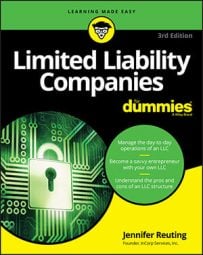Finding out whether the name you want for your limited liability company (LLC) is available is difficult, mostly due to the level of fortitude it takes to scratch a beloved name or two off your list when you find that it’s unavailable for use. As difficult as parting with some of your favorites may be, you must do so if they’re already in use.
Otherwise, not only could you be forced to change your company name down the road after you’ve gained a considerable following, but there’s a good chance that you’ll have to pay for a pricey legal battle in the process.
Checking names in your state
If the name you choose conflicts with a name already in use in your state, the secretary of state will reject your articles of organization, and you’ll be required to select a different name before resubmitting. This change can be costly (some states don’t return filing fees for rejected filings!) and time-consuming.
When checking to see whether a name is conflicting, most states take into account only the businesses that are in good standing. So if a corporation or an LLC is using the name you want but is in “revoked” status, then you have a very good chance of being able to use the name.
The term conflicting is pretty subjective, and the decision whether to allow your name often depends on how conservative the state employee who files your articles is in her evaluations. However, you can get a relatively good idea of whether your name conflicts with others by conducting a name search in your state.
You can request a free name search at MYLLC. This option is especially valuable if your state doesn’t allow you to search company records online.
If the name you want isn’t available, you may have a work-around. Assuming that the name doesn’t conflict with any existing trademarks, you may be able to file the LLC under a different name and then file for a fictitious firm name (a DBA) with your county clerk.
Getting the name you want with a DBA
Also referred to as a fictitious firm name, trade name, or assumed name, a DBA (short for “doing business as”) is a name that is secondary to the name your company uses to identify itself in its articles of organization.
A DBA filing is normally done with the clerk’s office of the county in which your business is located and gives your LLC authorization to transact business under that name, including opening a bank account, advertising to potential customers, entering into lease agreements, and taking on debt.
Having a DBA does not change the name of the business; rather, it creates a secondary name under which the business is permitted to operate. Just keep in mind that the official name of your company — the name that’s listed on the articles of organization — is the name you put on your tax returns, your membership certifications, and any government or official documents.
A business can register an unlimited number of DBAs. Having multiple DBAs can be useful if you’re looking to operate certain segments of your business or market certain products under distinct business names while keeping everything under the same LLC. This is very common.
Keep in mind, though, that a DBA does not give your company an exclusive right to use that name. The only way to obtain exclusivity for a DBA is to file a trademark. Likewise, a DBA doesn’t guarantee that someone hasn’t already trademarked the name in your particular industry, thereby making it unavailable for use. Therefore, doing a trademark search before committing your company to using this secondary name is imperative.
Conducting a trademark search
When a company wants to protect its name from being used by other companies in similar industries, it obtains a state or federal trademark. A state trademark gives the trademark holder exclusive rights to use the name in that particular state. A federal trademark, filed at the U.S. Patent and Trademark Office, gives exclusive rights to use the name throughout the entire United States.
This means that, for the most part, the company that has trademarked that name or set of words is the only company that has the right to use those words in that business sector.
Before committing to a business name, you must do a comprehensive trademark search for the name that you want to use. You, an experienced law firm, or a trademarking company can do this search. If the name you’re interested in is available, register it as a trademark immediately, before anyone else does, so that you have the exclusive right to use the name. Better safe than sorry.
You can conduct a trademark search online at the U.S. Patent and Trademarks Office’s website by searching its TESS (Trademark Electronic Search System) database.
When reviewing the search results, be sure to pay attention to which IC class the word was trademarked in. This information is incredibly important when determining whether a name is available for use.
Going global
It is important to do a linguistic assessment of your name to make sure that it doesn’t have a negative connotation in another language, but that’s not your only concern when going global. When you’re ready to take your business to the next level, you need to make sure that your chosen name is available for use in the countries in which you want to operate.
The United States isn’t the only country that offers federal trademark protection to businesses. Almost every country has some sort of system in place or is part of an international consortium that provides a legal infrastructure for such matters. Other countries don’t care if you have legal authority for your name in the United States.
If a conflicting trademark is already filed in another country’s jurisdiction, that trademark prevails, and you have to choose a unique name in order to legally operate in that country.

